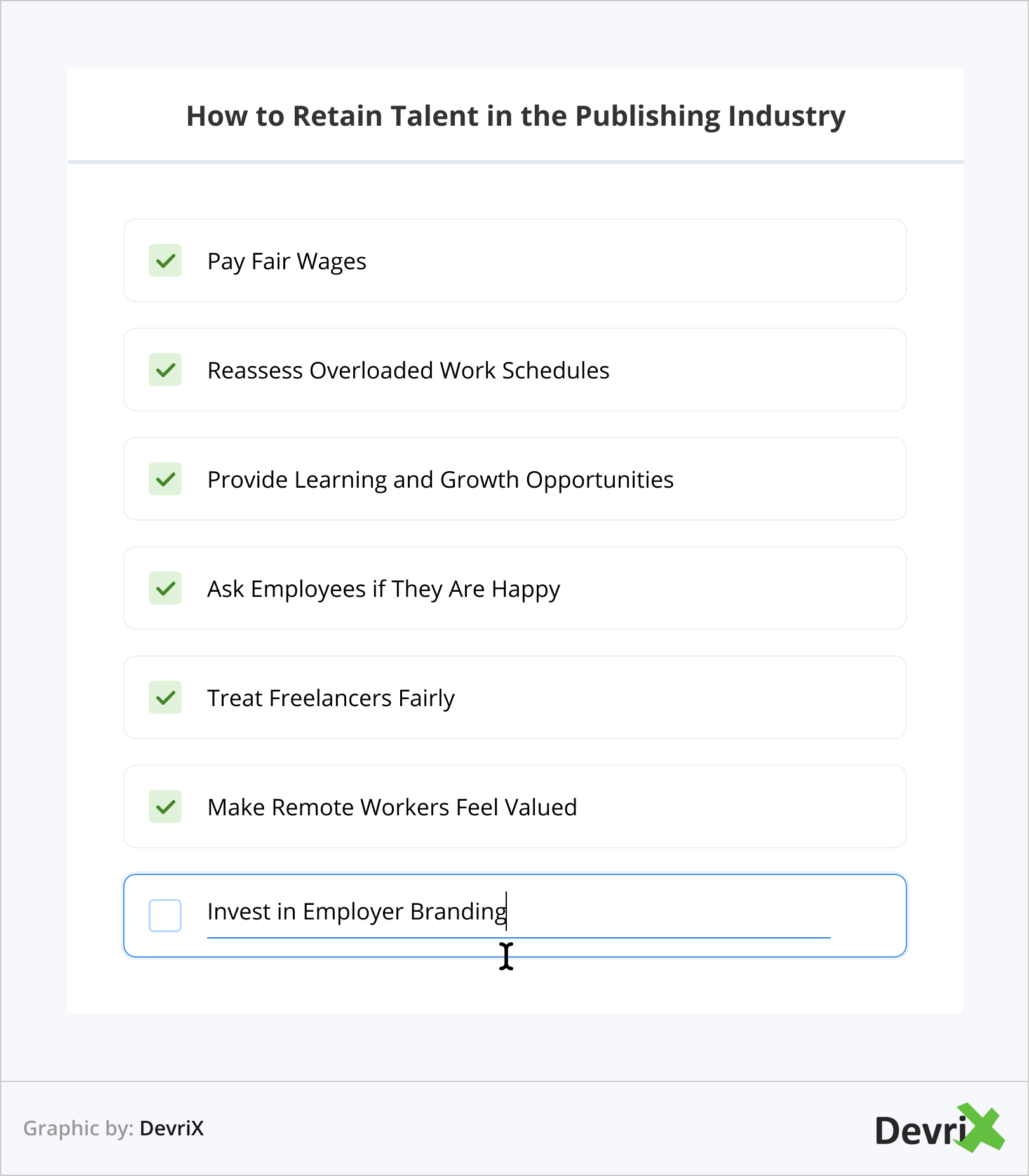Retaining talent can be challenging in any industry. Media and publishing are no exception to this. Regardless of whether we are talking about journalists, content writers, marketers, editors, data analysts, or AdOps, it’s becoming quite difficult to keep skilled professionals around.
However, in digital publishing, a business’s success is defined by its talent. It depends entirely on how fresh and unique the information is, how it is presented, and how compelling it is to the reader.
Finding the people that can deliver determines how popular and authoritative you are as a source. Also, it shows whether you attract advertisers, and if, in the end, can manage to build up revenue from subscriptions.
And yet, you don’t only need to identify and hire the right talent. You need to keep them around and allow them to grow and develop inside your organization. Also, you need to earn their loyalty and dedication.
And that has become more difficult than ever.
The Great Resignation

The rise of remote work and the open career market that allows people to seek employment, practically, anywhere around the globe have lifted the bar high. Especially in industries, such as publishing, where almost any job can be done remotely.
Furthermore, life has drastically changed over the past few years due to the global pandemic. This has pushed people towards self-reflection and reevaluation of their current states of affairs.
As a result, the workforce has not only focused on setting its priorities straight, but people are taking more risks, asking for more, and quitting jobs that don’t make them happy.
This has put employers in a tough position.
While the war for talent is not a new phenomenon, what the post-Covid-19 labor market is suffering from, commonly known as the great resignation or the Big Quit, is something the modern world hasn’t seen before. The way people feel about their jobs, their employers, and their career development has utterly changed for good.
Where Does That Put Digital Publications?
As mentioned, unlike many other industries, digital publishing relies heavily on talent.
Writing high-quality content is not something that you can learn overnight. A good story requires storytelling flair, instinct, writing skills, proper timing, dedication, people skills, knowledge of basic psychology, and so on, and so forth.
Not to mention that in some niches the requirements are even tougher. Publications that focus on investigative journalism and cover international affairs don’t simply need content writers. They need journalists who may, occasionally, have to play detective and may even need to risk their lives.
However, it’s not only writers and journalists that are in short supply. The same applies to marketers, editors, data analysts, and AdOps. These are all professionals that are integral to digital publishing However, they may have been growing increasingly less happy with their positions, and have been seeking out new opportunities in the international marketplace.
Without all these people, digital publishers are not able to provide quality content, market, and monetize it properly.
Furthermore, with all the fake news floating about on social media, and the thousands of publications fighting for the reader’s attention, it may be difficult to stand out even with a stellar team.
In such a turbulent marketplace, digital publishers can’t afford to lose their best talent. And yet, too many employees in the industry feel that they are being underpaid and underappreciated.
And these are only a few of the top reasons that are making them leave their current positions.
How to Retain Talent in the Publishing Industry
Now let’s have a look at 7 tips that will help you retain talent. Some of these are not limited to the publishing industry alone. However, a few will, nonetheless, apply to it more than other Industries.
What you may notice though is that no matter the industry you need to care of your employees and make them feel valued.
Here’s how:

1. Pay Fair Wages
People in the publishing industry are underpaid. That’s a well-known fact. The problem goes so deep that some employees literally can’t afford to do their jobs.
And that is the first and most important reason that makes people leave their jobs.
However, while this issue is not new, the post-covid recession along with the current problems associated with inflation is making it even more pressing.
Many journalists, writers, and marketers report that they haven’t seen a raise in years. Meanwhile, the prices of things are constantly increasing.
Furthermore, publishing is a vocation that requires dedication, involves risk, asks for many skills and sacrifices, and consumes excessive amounts of time.
Simply put, if you want to retain talent, you need to pay fair wages. Also, make sure that your employees don’t live under the poverty line.
This, of course, is easier said than done. Extra money has to come from somewhere. Also, people are generally not inclined to pay for information, especially nowadays, when they can find almost anything for free online.
However, quality journalism and content come at a price. Therefore, revamping your revenue model can help you convince your readers to cross the paywall and support your publication.
Digital Newspaper Subscriptions: Persuading Users to Cross the Paywall
2. Reassess Overloaded Work Schedules
People in the media industry are overworked, exhausted, and on the brink of burnout.
Digital publishing can be a stressful environment. Overloaded work schedules are not making it any easier. In fact, journalists and media specialists are infamous for pushing their limits at work.
Research shows that stress and long working hours can increase the risk of heart attacks, stroke, and other serious illnesses like cancer or respiratory disorders.
Furthermore, the pandemic has jeopardized the mental health of every person around the globe. More and more people are reporting that they are suffering from major burnout, and newsrooms are no exception to this.
In fact, burnout is one of the most commonly quoted reasons for writers and marketers to quit their jobs and even the industry. If you want to keep them around, you need to reevaluate your schedules. Also, encourage personal time and paid leave, and show that “the grind” is not all that matters anymore.
3. Provide Learning and Growth Opportunities
One of the top issues in the publishing industry is that employees, especially writers and journalists, don’t feel that they are given the opportunity to grow in their profession.
They keep doing the same thing over and over again without any clear perspective of growth.
Simply put, if people don’t see any opportunities for growth in their current position, they may not see a reason to stay.
However, employers are not powerless against this. In fact, there is more than one solution to the issue:
- Encourage learning. Offer your employees the opportunity to learn and develop their skills while they work in your publication. You can provide resources, pay for courses, organize workshops, etc.
Make this part of your work culture, and, above all, make it part of their working hours.
As mentioned, people already work too many hours to have time to learn after hours. By allowing them to grow their professional skills during office hours, you can both benefit.
- Create mentorship programs. Teaching and sharing their skills and experience with younger colleagues can be a great way for senior employees to share their work experience. Furthermore, it can make them feel more appreciated and valued.
By putting senior employees in such a position, you are giving them a chance to grow both professionally and personally, and at the same time, you are making it more likely to retain new talent.
- Map out career plans. Allow employees to develop within your company. Show them that they don’t need to go elsewhere to find their dream job, because you can give it to them.
It’s a major mistake to keep a person in the same position for years only because they are convenient to have there. And if you don’t have a position that matches their development path, create one! This way both your employees and your company will grow.
4. Ask Employees if They Are Happy
Many employers mistakenly believe that their employees are happy where they aren’t, and don’t see a reason to change anything.
However, taking people for granted never ends well. At least not for the employer. If a person feels underappreciated and/or wants to grow and develop, denying them the chance to do so inside your company will only push them away into the hands of a competitor willing to offer them more.
If you want your team’s loyalty, you need to give them more than simply a job. You need to provide them with a career path.
The simplest way to find out what your employees want and need in order to stay is to just ask them.
To that end, you should consider scheduling feedback sessions. But not the type where you evaluate the person’s performance, but where you ask them questions about how they’re feeling about their current position.
Are they happy with their current position? If not, what can be improved? Do they see a future in your company? Do they have other offers that they are considering and why? What can you do to improve their workspace?
Just ask them about themselves and their job. Be sincere. And most importantly, make sure you listen and then follow up on what they say.
5. Treat Freelancers Fairly
When it comes to content creation, freelancers are one of the (not so) secret powers of print and digital publishing. They can deliver the best stories, work with fierce dedication, travel more freely, and are not bound by the same schedules and rules as in-house content writers and journalists.
However, to have access to their talents and the benefits they bring, you need to treat them fairly and pay them what they’re worth.
Otherwise, you risk that next time you need their services, they will sell their work to someone else who appreciates them.
Freelancers may not be “your employees”, but if you want to have their loyalty and be their first choice, you need to earn it.
6. Make Remote Workers Feel Valued
The post-covid newsroom is nothing like the way it used to be.
In fact, only 9% of publishers plan on going back to their previous work model from before the pandemic.
Remote and hybrid environments are the new normal and both employees and employers are learning how to live with the changes.
However, as great as this new detached model is, it has its downsides as well.
A common issue for digital publishing professionals, who work remotely, is that it is difficult for them to feel part of the team.
Especially when the company is not a completely distributed one, and a larger part of the workforce is on-site.
If you don’t take special care to make remote employees feel part of the team, involve them in activities however you can, and make them feel appreciated, you risk losing them.
You should strive to show them that they are valued, work on building a connection with them, keep them involved, and make them feel that they are not missing out on anything.
Building a remote culture may be a challenging task, but it’s definitely worth the effort. It makes it possible to attract and retain talent from all over the world, widen your scope, reach new audiences, and increase the quality of your content.
7. Invest in Employer Branding
In the past, if you wanted to hire a person, who lives in a different town or country, you had to convince them to abandon their whole life and move, in order to work for you. Now you only need to show them that you can offer them more than your competitors. And we are not talking only about money here, although, as mentioned, this can be a major factor.
With the open job market thriving, a talented content writer or marketer isn’t likely to search very long to find someone who is ready to pay what they are worth. However, even if you do pay well, they may decide to decline your offer if they don’t feel your values, ethics, and reputation match their requirements.
Publishing has always been about finding the right fit where you can express yourself, be heard, and make a difference. To be able to do that, a person needs to find their place. And if you want to be that place, you need to put in the effort and work on your employer branding.
If you don’t stand behind your values, and you don’t treat your employees fairly, or make them feel valued they are very likely to leave. Your team needs to know that they can count on you and need to see a future in your company.
Remember,when it comes to such things, employees talk, and before you know it, your reputation may precede you and you will find it difficult not only to retain talent but to attract new employees as well.
Bottom Line
As with many other industries, retaining talent in digital publishing has become more difficult than ever before.
Journalists, marketers, data analysts, editors, AdOps, managers – everyone is experiencing a new outlook on life that affects the way they feel about their work and the industry they are in. To retain them, you need to provide good job security, make them feel valued, and give them a sense of purpose.




